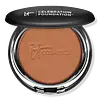IT Cosmetics Celebration Full Coverage Powder Foundation Versus Physician's Formula Mineral Wear Talc-Free Mineral Airbrushing Pressed Powder SPF 30
What's inside
What's inside
 Key Ingredients
Key Ingredients

 Benefits
Benefits

 Concerns
Concerns

 Ingredients Side-by-side
Ingredients Side-by-side

Lauroyl Lysine
Skin ConditioningZinc Stearate
Cosmetic ColorantEthylhexyl Palmitate
EmollientCaprylyl Glycol
EmollientEthylhexylglycerin
Skin ConditioningSerica Powder
Skin ConditioningWater
Skin ConditioningTocopherol
AntioxidantGlycerin
HumectantSodium Hyaluronate
HumectantAscorbyl Palmitate
AntioxidantIsopropyl Palmitate
EmollientIsopropyl Myristate
EmollientButylene Glycol
HumectantHydrolyzed Collagen
EmollientOlea Europaea Fruit Extract
BleachingAloe Barbadensis Leaf
MaskingAloe Barbadensis Leaf Extract
EmollientCarbomer
Emulsion StabilisingSodium Lactate
BufferingCarica Papaya Fruit Extract
Skin ConditioningPolysorbate 20
EmulsifyingSodium Benzoate
MaskingPotassium Sorbate
PreservativePalmitoyl Tripeptide-1
Skin ConditioningPalmitoyl Tetrapeptide-7
Skin ConditioningMica
Cosmetic ColorantCI 77891
Cosmetic ColorantCI 77491
Cosmetic ColorantCI 77492
Cosmetic ColorantCI 77499
Cosmetic ColorantCI 77007
Cosmetic ColorantCI 19140
Cosmetic ColorantLauroyl Lysine, Zinc Stearate, Ethylhexyl Palmitate, Caprylyl Glycol, Ethylhexylglycerin, Serica Powder, Water, Tocopherol, Glycerin, Sodium Hyaluronate, Ascorbyl Palmitate, Isopropyl Palmitate, Isopropyl Myristate, Butylene Glycol, Hydrolyzed Collagen, Olea Europaea Fruit Extract, Aloe Barbadensis Leaf, Aloe Barbadensis Leaf Extract, Carbomer, Sodium Lactate, Carica Papaya Fruit Extract, Polysorbate 20, Sodium Benzoate, Potassium Sorbate, Palmitoyl Tripeptide-1, Palmitoyl Tetrapeptide-7, Mica, CI 77891, CI 77491, CI 77492, CI 77499, CI 77007, CI 19140
Titanium Dioxide 15%
Cosmetic ColorantZinc Oxide 10%
Cosmetic ColorantMica
Cosmetic ColorantTricaprylin
MaskingBoron Nitride
AbsorbentZinc Stearate
Cosmetic ColorantLauroyl Lysine
Skin ConditioningCalcium Aluminum Borosilicate
Camellia Oleifera Leaf Extract
AstringentChamomilla Recutita Flower Extract
MaskingGinkgo Biloba Leaf Extract
Skin ConditioningPanax Ginseng Root Extract
EmollientCarthamus Tinctorius Seed Oil
MaskingTocopheryl Acetate
AntioxidantRetinyl Palmitate
Skin ConditioningAscorbyl Palmitate
AntioxidantChlorphenesin
AntimicrobialPotassium Sorbate
PreservativeSodium Dehydroacetate
PreservativeIron Oxides
Titanium Dioxide 15%, Zinc Oxide 10%, Mica, Tricaprylin, Boron Nitride, Zinc Stearate, Lauroyl Lysine, Calcium Aluminum Borosilicate, Camellia Oleifera Leaf Extract, Chamomilla Recutita Flower Extract, Ginkgo Biloba Leaf Extract, Panax Ginseng Root Extract, Carthamus Tinctorius Seed Oil, Tocopheryl Acetate, Retinyl Palmitate, Ascorbyl Palmitate, Chlorphenesin, Potassium Sorbate, Sodium Dehydroacetate, Iron Oxides
Alternatives
Ingredients Explained
These ingredients are found in both products.
Ingredients higher up in an ingredient list are typically present in a larger amount.
Ascorbyl Palmitate is created by combining pure Vitamin C and palmitic acid. It is an antioxidant and helps reduce hyperpigmentation.
This ingredient is a more stable version of Vitamin C, meaning it does not disintegrate as quickly when exposed to sunlight. However, studies show it does not penetrate skin as well as pure Vitamin C.
Ascorbyl Palmitate is oil soluble.
Read more about other types of Vitamin C:
Learn more about Ascorbyl PalmitateThis ingredient comes from a fatty acid (lauric acid) and amino acid (lysine). It is used to add a silky feel to cosmetics.
According to a manufacturer, its fatty acid base leaves a silky feeling on the skin. It also has emollient properties because of this. Emollients help soften skin by preventing water from evaporating.
Lauroyl lysine is barely soluble in water.
Learn more about Lauroyl LysineMica is a naturally occurring mineral used to add shimmer and color in cosmetics. It can also help improve the texture of a product or give it an opaque, white/silver color.
Serecite is the name for very fine but ragged grains of mica.
This ingredient is often coated with metal oxides like titanium dioxide. Trace amounts of heavy metals may be found in mica, but these metals are not harmful in our personal products.
Mica has been used since prehistoric times throughout the world. Ancient Egyptian, Indian, Greek, Roman, Aztec, and Chinese civilizations have used mica.
Learn more about MicaPotassium Sorbate is a preservative used to prevent yeast and mold in products. It is commonly found in both cosmetic and food products.
This ingredient comes from potassium salt derived from sorbic acid. Sorbic acid is a natural antibiotic and effective against fungus.
Both potassium sorbate and sorbic acid can be found in baked goods, cheeses, dried meats, dried fruit, ice cream, pickles, wine, yogurt, and more.
You'll often find this ingredient used with other preservatives.
Learn more about Potassium SorbateZinc Stearate is the metal salt of stearic acid. It is a white solid used to bind, thicken, and lubricate products.
This ingredient is common in powder makeup, where it helps keep the powder together.
Zinc Stearate is hydrophobic and repels water.
This ingredient can be sourced from non-animal or animal sources. It is best to reach out to the brand to see where they source this ingredient from.
Learn more about Zinc Stearate